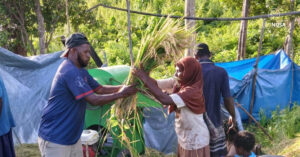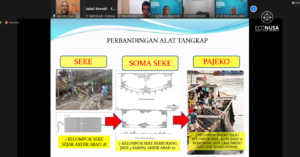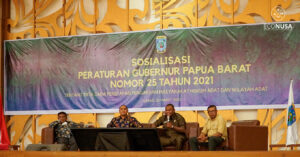
Continuing the journey from Jayapura, the 2019 School of EcoDiplomacy (SED) was again held in Manokwari on 18-22 November 2019. As SED 2019 participants in Jayapura, SED 2019 participants in Manokwari also took a field trip, this time, a field trip was conducted at Taman Wisata Alam (TWA) Gunung Meja and Petrus Kafiar Beach, Manokwari, West Papua.
One of the new methods introduced to SED participants is the kikigaki method which literally means listening and writing in Japanese. The Kikigaki method originates from Japan and was developed by Japanese ethnographers who use this method to record the tracks and stories of meijin or the older generation on the coast of Japan who maintain and pass down local wisdom through direct face-to-face dialogue.
Through this method, participants are invited to not only go directly to the field and make observations in their field trip areas but also learn directly from local people who have traditionally lived in the place and actively protect nature with their local wisdom.
Participants who came to TWA Gunung Meja, had a direct discussion with Mr. Yulius, a resident of Kampung Ayambori who lived next to Gunung Meja. Through discussions with Mr. Yulius, participants received information about eight natural springs around the Table Mountain that support the life of Ayambori Village. Not only that, they also directly listened to issues such as a lack of awareness to protect the environment at TWA Gunung Meja, which disturbed local residents.
Meanwhile, another Manokwari SED 2019 participant visited one of the beaches in Manokwari, West Papua, namely Petrus Kafiar Beach. Here, the participants chat with one of the most elder fishermen in the village, Mr. Yan Piet Auri. Mr. Yan Piet Auri is 70 years old and has nine children, 34 grandchildren, and one great-grandchild. He has been a fisherman for decades and his right hand must be amputated due to the use of bombs for fishing. According to Mr. Yan Piet Auri, fishermen around Petrus Kafiar Beach have begun to abandon the practice of using bombs for fishing. Aside from being life-threatening, this practice can also damage the marine ecosystem around Petrus Kafiar Beach.
Participants of SED 2019 Manokwari admitted that they were quite impressed with the Kikigaki method because they were able to gain a lot of knowledge from local people who had lived together for almost all their lives with nature and continued to try to preserve nature around them.
Kikigaki is not only useful as learning to protect the environment, but also to preserve local wisdom that has been handed down in a region. In addition, this method is also useful to be a bridge between generations so that young generation who are actively protecting the environment such as SED 2019 participants can continue to maintain this local wisdom in their involvement in protecting and caring for the environment.




